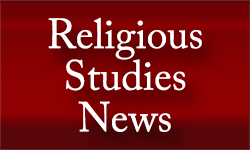|
RSN October 2013Contents
Annual Meeting News
|
Regional Development Grants 2013–2014The AAR Regions Grants Committee awarded four Regional Development Grants for the upcoming year: Efforts for Authentic Interreligious DialogueSubmitted by Sally Holt, Ossama Bahloul, Ron Messier, and Rami ShapiroOver the past several years, every mosque in Middle Tennessee has been targeted by vandals in some way. The Islamic Center of Murfreesboro, Tennessee has been targeted numerous times and the building of this center, completed in July, 2012, caused such an uproar that it drew national attention. Last year in Tennessee, legislation that would have outlawed Sharia law was proposed by a state senator and a state representative. The proposed legislation was defeated. In the midst of such events, it is apparent that there is a need to promote understanding and tolerance among adherents of different religious traditions, not only in middle Tennessee, but also throughout the United States and elsewhere. All too often, accounts of religious intolerance and misunderstanding are scattered across the news. As the religious landscape of the United States becomes more pluralistic, interreligious dialogue becomes more of a necessity. There is a challenge for religious leaders to model authentic dialogue for community members that will truly engender a deeper understanding of religious similarities and differences that will foster not only tolerance and peaceful cohabitation, but also dynamic and productive interfaith communities. This project will bring together religious leaders and scholars to model such dialogue in the AAR’s Southeastern Region. The Regional Development Grant will help provide a solid start for this inaugural conference that the participants plan to hold on an annual basis. Religion, Place, and Pedagogy: Establishing a Bio-Regional Network of Teacher-Scholars in Religion and EcologySubmitted by Jennifer Ayres, Cory Labrecque, and Bobbi PattersonHow can religious and theological learning be deepened by sustained attention to and engagement with the particular place in which education is happening—and with particular attention to ecological contexts more broadly? What challenges and opportunities greet teachers of religion and theology who seek this kind of deepened engagement through place-based pedagogies integrated with other models of teaching and learning? This project will establish a network of inquiry-driven scholars and teachers interested in the powers and stories of particular places, histories, geographies, and cultures shaped by—and shaping—religious experiences and expressions in the southern United States. The project will advance existent place-conscious pedagogical approaches at the intersection of religion and ecology in response to today’s crises in sustainable living. World Religions in California Contexts: A Faculty Workshop to Develop an Online Resource for the Public Understanding of Religion in CaliforniaSubmitted by Kate McCarthyReligion topics are claiming many headlines in the United States lately, on subjects ranging from the growth of the religiously unaffiliated "nones" to the new role of religion in international diplomacy to perennial analyses of the religious motivations of terror attacks. These stories reflect increasing awareness of the significance of religion in public life, even as public discussion of these issues—as illustrated, for instance, in the online comments these stories often generate—often showcases the high level of American religious illiteracy. The growing complexity of religious identity and its relation to other dimensions of civic life creates further challenges for public understanding. This grant will fund a two-day workshop for AAR Western Region members to draft the plan for a set of online resources for K–12 educators and others on world religions in California contexts and support the initial setup of the website that will house these resources. Materials on the site will include primers on beliefs and practices of the range of religions present in California; video interviews and mini-documentaries, interactive maps and calendars of regional religious life; and short, accessible analyses by expert scholars on such topics as religion in California schools, immigration and religious identity, religion and civic engagement, and sites of religious conflict and cooperation. Colloquium Speaker Series on Teaching and Learning in the Religious Studies Learning SpaceSubmitted by Sabrina MisirHiralall and Daniel McClainThe Mid-Atlantic Region supports collegiality throughout the entire year as opposed to solely at the annual regional conference. The region is committed to an ideal of academic excellence that promotes a love for teaching and learning through intellectual rigor. For this reason, we propose a colloquium series as a part of our regional scholarly activities for the 2013–2014 year. MAR-AAR 2013’s Wabash Workshop inspires this colloquium series. From the Wabash consultants, Richard Ascough and Carolyn Medine, the region learned how important it is to move forward with the teaching and learning needs of the region in mind. This colloquium series on teaching and learning will focus on this year’s regional conference theme: Lived Experience. Our primary aim is to challenge our need to improve as a region by providing a learning space for all members of the region to engage in rigorous intellectual discourse. We aim to build a community of regional scholars who will meet to share their expertise and learn from each other with the goal of improved teaching in mind. We hope to gain new regional members as we build AAR membership with our cross-disciplinary invitation to graduate students, faculty members within academia, and independent scholars.
Vist the AAR's Regional Development Grants page to learn more about funding in support of regional development and to view previous grant winners and their full proposals. |

